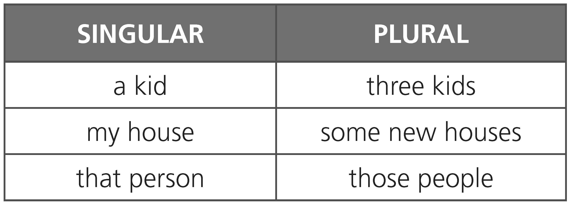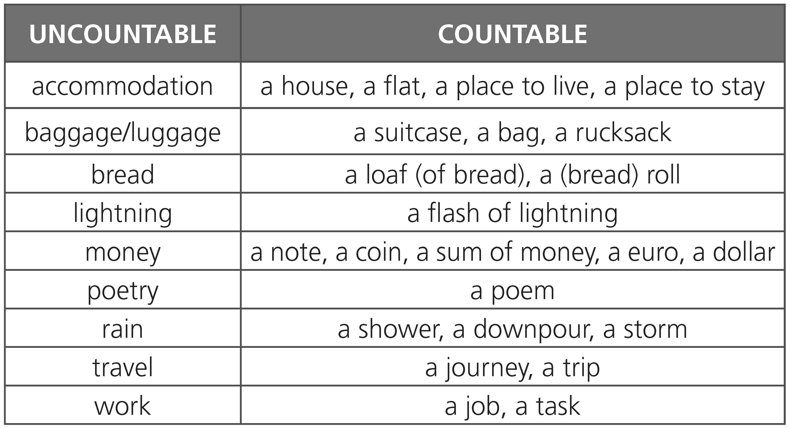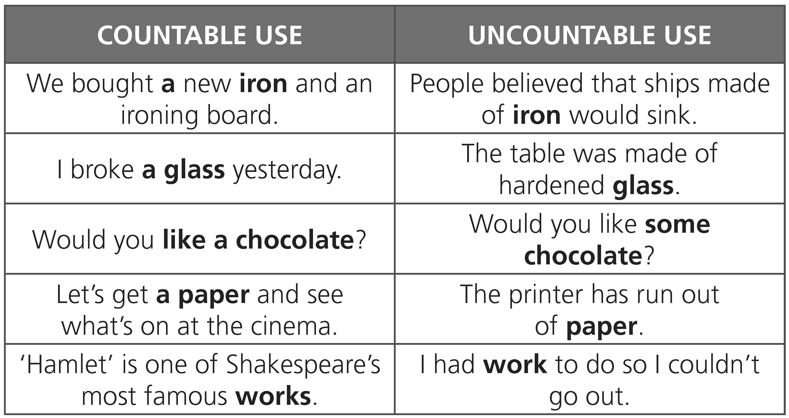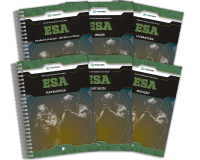COUNTABLE/UNCOUNTABLE NOUNS
COUNTABLE NOUNS
Substantivos contáveis são aqueles que possuem formas singular e plural.

https://dictionary.cambridge.org/pt/gramatica/ gramatica-britanica/nouns-form#nouns-form__3
UNCOUNTABLE NOUNS
Em inglês, dizemos que são incontáveis os substantivos que nomeiam líquidos (Ex: water, soda, juice), alguns grãos (Ex: rice, sugar, salt), substantivos que representam uma categoria (Ex: transportation, equipment, clothing) e também substantivos abstratos (Ex: love). Esses substantivos não podem ser utilizados com artigos indefinidos, numerais e não possuem forma plural.
- Ideias ou experiências: advice (conselho), information (informação), progress (progresso), News (notícia), luck (sorte), fun (diversão), work (trabalho).
- Materiais e substâncias: water (água), rice (arroz), cement (cimento), gold (ouro), milk (leite).
- Palavras relacionadas ao clima: weather (clima), thunder (trovão), lightning (raio), rain (chuva), snow (neve).
- Nomes que indicam grupo: furniture (mobília), equipment (equipamento), rubbish (lixo), luggage (bagagem).
Exemplos:
We’re going to get new furniture for the living room.
Not: We’re going to get a new furniture for the living room. orWe’re going to get new furnitures for the living room.
We had terrible weather last week.
Not: We had a terrible weather last week.
We need rice next time we go shopping.
ProBizu: Alguns substantivos que são considerados contáveis em outras línguas, podem ser incontáveis no inglês:
Exemplos:
They can give you some information about accommodation at the tourist office.
Not: They can give you some informations about accommodations at the tourist office.
Can you give me some advice about buying a second-hand car?
Not: Can you give me some advices about buying a second-hand car?
Para fazer referência a quantidade de um substantivo incontável, podemos utilizar expressão de medida.
Exemplos:
He bought a very expensive piece of furniture for his new apartment.
Maggie always has some exciting bits of news when she comes to see us.
I think we’ll need five bags of cement for the patio.
There’s a litre of milk in the fridge for you. And I bought you a bar of chocolate.
Podemos pluralizar palavras incontáveis para representar sua quantidade, porém em contextos informais.
Can I have two teas and one coffee, please? (two cups of tea and one cup of coffee …?)
A: How many sugars do you want in your tea? (How many spoonfuls/lumps of sugar?)
B: Just one, please.
To some degree we tend to eat the foods that we ate as children. (i.e. types of food)
Podemos utilizar expressões frasais com substantivos contáveis para citar um exemplo individual sobre algo ao qual um substantivo incontável faz referência.

https://dictionary.cambridge.org/pt/gramatica/gramatica-britanica/ nouns-countable-and-uncountable
Alguns substantivos podem ser considerados contáveis ou incontáveis, porém com significados diferentes.

https://dictionary.cambridge.org/pt/gramatica/gramatica-britanica/ nouns-countable-and-uncountable
Alguns substantivos abstratos podem ser vistos como contáveis ou incontáveis. Quando contáveis possuem um sentido mais particular, já quando incontáveis sentido mais amplo, abrangente.]





